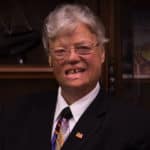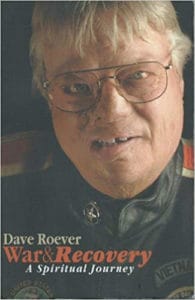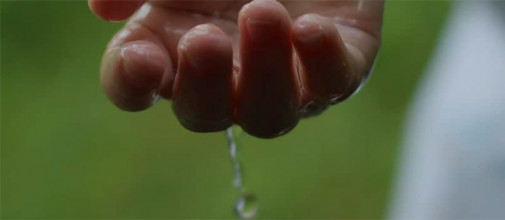Opening:
John Fuller: On this Veteran’s Day we want to thank every man and woman who has ever worn a uniform to protect this great land. This is Focus on the Family with Focus president and author, Jim Daly and I’m John Fuller.
Jim Daly: John, I’ve never served in the military, but I have deep, deep appreciation for those who have. My brother did and you know, donors, supporters of the ministry that I have met have served in the military sometimes in tragic circumstances and my heart goes out to them.
If you’ve ever sat with somebody who has been in battle, in the field of combat, it is an overwhelming experience to hear from them what they have gone through. So many of those men and women can’t talk about it, but today we do want to talk about it with a very special guest.
You know, Romans 8:28 sometimes is hard to understand, that all things, really, Lord, all things can work for good? Some people are in a spot in their life right now where that is unbelievable. It’s hard to embrace that, but yes, it’s true. All things work for good to those who love the Lord and are called by His name and you’re gonna hear a story today that gives you evidence for that.
John: Dave Roever is our guest today and his name may very well be familiar to you. It’s a great honor to have him here joining us in the studio. He’s a U.S. veteran and he has an incredible story of just that, Romans 8:28, overcoming really difficult circumstances and seeing God work in them.
He sustained injuries in Vietnam in 1969 that altered his life. Dave writes about the lessons he’s learned in a book called, War and Recovery: A Spiritual Journey, and it’s a riveting account that we would recommend to you.
Body:
Jim: Dave, let me welcome you to Focus on the Family.
Dave Roever: Thank you.
Jim: First of all, thank you for your service to this nation.
Dave: It’s an honor to serve. It is an honor to serve. I … I can’t say that enough. Uh…Today I’m still involved. I … I can’t stop. I’m addicted to the cause of freedom. I’m addicted to the cause of our young warriors and at the beginning of this war, on 9/11, I knew we were gonna go to war and I made a vow. I made a vow before God and before my family and for my nation, I made a vow that I would not sit by and do nothing.
At that moment, I entered into what has been since September 11th, 2001, a non-stop move forward to work with our troops, through the Department of Defense as a contractor, and I am never, never, never … I’ve never been happier in my life.
Jim: . And you know, Dave, many people who are listening don’t know the story, so I want to start there.
Dave: Good.
Jim: I want to start back in Vietnam. That’s where you were as a young man in that battle and let’s talk about that. Tell us what age did you go in? What branch of the military?
Dave: Sure.
Jim: And then what happened on that day that really changed your life?
Dave: Well, I’ll start with this story and you interrupt anytime you want to (Laughter), to ask clarification, because it is … it’s a step-by-step fulfillment of Romans 8:28.
Jim: Huh.
Dave: I have never been more convinced that in the fracas, in the fray, in the … in the middle of the battle, you don’t see it, but one day when you look back, the fingerprints of God are all over your life and you realize, He took what terminology we would call “bad,” and used it for so much good. I … my face is blown off my head. I’m sittin’ here with half of a face. Actually, three quarters of my face was blown off. At the moment that happened, no one could’ve convinced me this is good, but today, because of these scars, I have entrée to our military worldwide in every battlefield of our nation’s experience.
Jim: Well, and I … I want to get to that, but tell us what happened.
Dave: Let’s go there. I was a preacher’s kid. No one in our family ever served in the military and I had no intention of serving. I was in a Bible college. I wasn’t doing real good academically. I was working 70 hours a week, carrying 21 hours of college.
Jim: Wow.
Dave: It’s impossible. Married, making car payments, house payments, school payments.
Jim: How old are you at this point?
Dave: At that point, I was 20 … 21-years-old, 20 … or 21-years-old.
Jim: Married to Brenda, who’s 19?
Dave: That’s right.
Jim: 18?
Dave: I … exactly and we got married at … I was 20; she was 18. My dad had to sign for me. I had no intention of military, but the war in Vietnam would change the rules of life for our family. And I didn’t want to go in the Army, ‘cause I thought they might hurt me, so I joined the Navy, where I thought I’d be safe. And I ended up in the Special Warfare Command, which is … includes the Navy Seals and the Special Dive Vehicle teams and the Brown Water Black Beret and they’re the guys that got to drive the super-fast boats, loaded with guns and four guys. And I’m tellin’ ya, that was so appealing, I joined and I said, “Let’s go for it. Let’s give it our best shot.”
Jim: So, you go through the training and you head off to Vietnam.
Dave: I did and the training included running, which preacher’s kids never did. (Laughter) God never intended fat boys to run. (Laughter) Fifteen minutes after we were through runnin’, I was still jiggling all over, you know. And I had to lose some weight, and I had to … I … it was the most difficult training I’ve ever been through in my life.
Jim: But you did it.
Dave: I did it, and it saved my life in the end, because I was so physically fit, the explosion that should’ve killed me, I was able to endure by the grace of God.
Jim: What happened? Give us … paint the landscape, where you’re at, and then what occurred that caused the injury.
Dave: One connecting thing to add to it is, kissing my wife goodbye. When I kissed that little teenage girl goodbye and went to Vietnam. I can still taste the salt of her tears on my lips. I honestly mean that. If I lick my lips, my brain recalls that taste, and I turned and walked away and she said, “Davey,” and I froze in my tracks. I turned and I said, “What?” She said, “Are you coming back?” And I lied to my teenage bride. I said, “I’ll be back without a scar.” And that was the first clue God gave me that I was coming back, but she would not get the man she married back from war.
Jim: Oh, man.
Dave: And so, I ended up in Vietnam. I was there eight months, and on the eighth month I was injured two times, only two days apart. On the third day after my first injury, I was holding a white phosphorus hand grenade.
And I drew the grenade back to burn down some high brush, detonate booby traps, put up smoke and and just as I prepared to throw, I didn’t know I was in the crosshairs of a sniper and he pulled off a round and I didn’t know this. What I thought, I thought I was hit by a rocket.
And so, all of a sudden, my world is in a world of horror. I looked down and my face is on my boots. I looked a little closer and I can see my heart beating. I’m standing there and skin’s dripping off of me. I can … there’s a loud ring in my right ear, and it was blown off, as you can see sitting here together. It’s artificial. My face was blown off. My hair was blown off. But that day on the river bank, I lost more than my hair or my ear, or my nose, or my face, or my chest, or my back, or my fingers. That day, I lost my identity. On the bank of that river, I would never be looked at as Dave Roever ever again, ever. No one would ever look at me and say, “Oh, that’s Dave Roever,” on the basis of my previous identity. Now I’m known by the scars of my body.
Jim: Dave, I can’t imagine, and again, this is an extraordinary story and as I’ve talked to Vietnam vets and some Iraq and Afghanistan vets, the things that you go through in the military in that kind of field of combat, not having experienced it, I’m in awe of the courage, the valor of that, to hear a bullet whistle by. That sniper hit that phosphorus grenade.
Dave: Right, I think he was shootin’ at my head. I mean, a head shot’s what they [do], if they can. And I’m standing in the gun tub and I’m exposed from the waist up. I’m standing between two 50-caliber anti-aircraft machine guns that are used for anti-personnel on the river banks of these boats.
Jim: Did … did you think you were gonna die? I mean, you’re—
Dave: Oh, absolutely.
Jim: –you’re … you’re totally conscious, which is amazing.
Dave: I never passed out. I was never unconscious. My … in fact, I think I was probably more alert than I’ve ever been in my life.
Jim: I bet.
Dave: And the grenade that was in my hand, again, not realizing, not realizing that it was my own grenade, thinking that I am hit by a rocket, it didn’t matter. The thing that mattered was, I’m being consumed in heat. I am being literally burned to death, right now, standing there in that moment. And I put my hands down on top of the white hot … now the guns were white hot with the heat from that phosphorus. And when I put my hands down on that gun, I sizzled, and I lifted myself up, rolled across the deck and splashed into the water.
Jim: Just the—
Dave: The water cannot extinguish white phosphorus. I burned in the water, absolutely unrestrained, as though I was out of the water. And I swam with strength that could not have come from adrenaline. It could only come from anointing. God Himself spared my life. There is no reason or rhyme. There is no comprehension of how a man can survive a white phosphorus grenade explosion six inches from his right ear.
And the phosphorus that was consuming my body cauterized the artery, sealed it off and saved my life from burning [bleeding] to death. The thing that almost killed me kept me alive and I can only say that is a God thing.
Jim: How … what happened? Where did you go? Who picked you up? And who saved you?
Dave: It’s called Dust Off. It’s a helicopter, and it’s sent in to … and it’s used in Iraq. I’ve done six tours to Iraq and two to Afghanistan. I see the Dust Off teams all over the war zones today. Same organization in Vietnam, but it was their daddies, instead of the young men that I was workin’ with in Iraq. The first time I ever got to say thank you to a Dust Off team was in Iraq, to the young kids of the fathers who saved my life on the bank of the river in Vietnam.
Jim: What’s their mission?
Dave: Their mission is to fly in no matter what the circumstance is, pick up the dead and wounded and get ‘em out and get ‘em to help. Well, they flew me in. They rolled me onto a stretcher. The stretcher caught fire. I fell through on my head. It was just one of those days–
Jim: ‘Cause you were still burning?
Dave: –when nothin’ goes right. I was still burning. Two weeks after I was injured, they opened me up to do surgery and the phosphorus exploded inside of me and I caught the room on fire. Phosphorus only needs oxygen or air to spontaneously combust. It was blasted in so deep, so fast, it was not … it did not all burn at the moment of my injury. But later on, two weeks later, when they opened me up, air made access to the phosphorus and it lit up, and they were literally fighting fire while they were cutting into me to try and save what limbs they could of my body.
Jim: So, here you are, this young man, the best shape of your life—
Dave: Yeah.
Jim: –and then you’re laying in this hospital room–
Dave: The worst shape of my life.
Jim: –the worst shape of your life, and when did that meeting occur with Brenda, and the emotion of that? Talk about that.
Dave: Thank you, because without that part of the story, it’s a tragedy, but because of that part of the story, it’s a triumph.
Jim: Wow.
Dave: They flew me to Japan. Off the river bank, they carried me into Saigon. From there, prepared me to go to Japan. And in Japan, I asked for a mirror. When I saw what was left, I couldn’t believe a teenage girl could still love me, so I tried to take my life, and I had no gun or knife. I pulled the tube out, and I laid my head back and I waited to die.
Jim: Where were you spiritually, Dave?
Dave: I was—
Jim: You’re a son of a pastor.
Dave: –I was strong in my faith, as strong as I’ve ever been, but let me tell you, every man has a breaking point and my breaking point came when I looked in the mirror and I said, “She cannot love me.” And that … people say, “Well, the worst day of your life was on the bank of the river.” Oh, no, the worst day of my life was laying in that bed, when I thought she will never love me, and I pulled the tube. I laid my head back. I waited to die and I got hungry. (Laughing) I got hungry. God gave me a hunger pain and I … I could not take my life that day. They got me to America to Brook Army Medical Center. I was there for a year and two months and the first day they let visitors come in.
And a woman walked in to the bed of the guy next to me. He was 100 percent third-degree. I was almost 50 percent third-degree.
Jim: So, he was 100 percent.
Dave: He … and no one ever survived it. No one in history has ever survived a 100 percent third degree. There’s no donor site. You have no place to take skin to put skin. There’s no … you … it’s impossible. So, she walked in, took off her wedding ring and threw it on his bed and she said, “You’re embarrassing. I couldn’t walk down the street with you.” And she walked out. I collapsed.
Jim: You heard that all.
Dave: In most … oh, yeah and I said, “Oh, God, what tube, what do I need to do to take my life? I don’t want Brenda to come in here and see me.” The reason I was in there and this was death row, no one was in that unit that was gonna live. And there was 13 in there. I never found one that survived except me.
The next person in was that little teenage wife. She stood at the end of my bed (Weeping), took off her wedding ring and instead of throwing it on my bed, reminded me we were together forever. She looked at me and she said, “I just want you to know I love you. Welcome home, Davie.” She bent down and kissed what was left of my face. She looked me in my good eye and I knew I could make it.
Jim: Wow.
Dave: I said, “I’m sorry.” And she said, “For what?” I said, “I’m sorry I can never look good for you again.” She said, “You never were good lookin’.” (Laughter)
Jim: Oh, man.
Dave: (Laughing) And so, I got a dose of reality that day. You shall know the truth and the truth shall tick thee off. (Laughter)
Jim: Well, I mean, Dave, that’s unconditional love.
Dave: Oh, yeah. It’s still there. She has to bathe me—
Jim: What a lady.
Dave: –to this day. I mean, I can’t take care of myself. She takes care of me in ways I … I would … I wouldn’t be here (Weeping), if it wasn’t for God and Brenda, and in that order. And they’re both present under this roof today.
Jim: Wow, what a woman.
Dave: What a woman.
Jim: What a woman.
Dave: And what a God.
(Emotion)
Jim: Amen. I mean, that is so powerful. You’re listening to Focus on the Family. Today we’re talking with Dave Roever, his book, War and Recovery: A Spiritual Journey. Dave it’s powerful. I … the emotion of it.
Jim: Can I ask you about this, too, ‘cause I know the story of your mom—
Your mom was also this powerful woman in your life.
Dave: Very powerful–
Jim: What did she say?
Dave: –and very invalid. From the time of my birth, she started dying, ended up for decades curled up in a fetal position in a nursing home incommunicado. But when she could speak and when she could communicate and when she could invest into my life, she poured in the most influential woman of my life next to my wife, my mother, who suffered and never blamed God. And in my entire life, I have never said, “Why me, God?” Because I never heard those words from my mother and I said, “If she could suffer and go through what she went through and never blame God, whatever I go through, I will never blame God, because these things only serve to make us stronger.”
Dave: She poured into my life and that probably is the most significant strength that I could have.
Let me ask you about, thinking about the story of the guy next to you in that ward, whose wife came in and took off the ring and said those horribly insensitive things to him in that moment of his desperation and with the soldiers that you’ve met not only in Vietnam, but Iraq and Afghanistan, where they don’t have the mom that you had or they don’t have the wife that you have, what do you say to them when they don’t have someone in their corner pullin’ for them?
Dave: The most common mind-set that will come out in 1,000 different ways of saying it, but it’s the same mind-set, I go back to these guys with, it doesn’t matter where you’ve come from; it’s where you are right now and where you go from here. You can’t “unring” the bell. You can’t dislodge that anchor that weighs you down from the past unless you’re willing to sever that past. You have to intentionally cut the strings of the past and say, “From this point forward, I move,” because there’s nothin’ out of the past that we can drag along that’s gonna help us.
Jim: What does that do for you when you do that? What is it doing for you?
Dave: For Dave Roever, it’s a continual daily healing. I honestly believe that if I didn’t have the opportunity to vent like I to … do today right here on “Focus,” if I don’t have the opportunity to vent constantly, I think that I would begin to corrode, spiritually. I think I wouldn’t make it. And … and having the opportunity to … to minister to these young troops, well, when I see the results, that’s my reward.
Jim: Yeah.
Dave: And when I feel the offloading of my history through giving them the experience I’ve been through as that evidence of ability to succeed, I’ve healed every day.
Jim: Dave, there’s a an end to this story that I want to capture in the last couple minutes here, because you returned to Vietnam with your son.
Dave: I did.
Jim: And as I read that and you have shared it, that’s powerful. What happened all these years later, when you went back to that riverbank?
Dave: It’s one of the most amazing moments, of course, in my life. I took my son and a camera crew, and we decided we were gonna go back to where I was injured. Well, I never sat down and read the rules and regulations of the Communist party in Vietnam. I just went to Vietnam with a camera crew and $100 bills, because $100 bills talked loud in Vietnamese language at that time.
I went back to the city, to the town, the little village of Tutu, and I gave two $100 bills to a boat captain who had what we called a water taxi. It was a long boat that was used kinda like a bus service in America, movin’ up and down the rivers. I didn’t realize that two $100 bills was an annual salary of income for the Communist people of Vietnam.
Jim: So, he was quite happy.
Dave: Oh, he was just overjoyed to help me, and we boarded onto that water taxi, and we started putt, putt, putt toward the Cambodian border. I don’t know how we did it, but we lost the Secret Service that was following us of the Communist party that day. We lost ‘em.
So, God gave me an unprecedented opportunity. I was photographing all the places I had been during the war, the bridges. That’s a no-no. That’s a strategic part of defense of Vietnam, or any nation. It’s bridges. How was … all the bridges I had gone under in my little fiberglass PBR – river patrol boat – and we got back to that bend in the river at a place called “The Parrot’s Beak.” That’s where I was injured.
Jim: What emotion did you feel?
Dave: Oh, I can’t describe it. My heart would race at the memories. I could touch the riverbank again. And when we beached the boat and we offloaded, and I’m standing where I was injured, where my skin, my blood, my very DNA is absorbed into the bank of that river, I was trying to describe for the camera, to my son, this is where I was injured. This is where I was … the boat was. I’m standing in the gun tub. I don’t know where the … the round came from and I don’t know where the helicopter landed.
And the boat captain of the boat that just brought us there, he starts describing the moment. Oh, the helicopter landed right over there to pick you up. And before he could catch himself, he caught … he realized he has just … he has just revealed he was there that day.
Well, it’s not unusual, because the riverbanks were lined with Viet Cong that were part of our resis … of the resistance of Vietnam against us. That man must have … he had to have been there to tell me where the helicopter landed to pick me up.
And before he could catch himself, it was too late. The words of his mouth entrapped him, and I caught the words. It was like a baseball bat. And I looked over at him, and he looked at me right in the eyes and fear overcame him, because he was alone that day.
Jim: Yeah.
Dave: Alone, he had no support, and what happened next is one of the turning points in my entire life. I walked over, got back up on the boat, ‘cause he was still at the helm of that water taxi. I walked into the … the helm’s … into the cab … little cabin, and I looked at him and I saw fear, and I reached out and I put my arms around him. (Weeping)
I put my arms around him, and I said, “I want you to know that I love you, and I care about you, and the past is the past. We start here today as brothers.” Tears filled his eyes, and he squeezed me and patted my back. That day, I found out what the cross of Calvary really meant.
First of all, Jesus didn’t go to Calvary in a limousine and die by lethal injection. They crucified the Son of God hands up, palms out, so the world could see His scars. And that man looked at my scars, and he knew my wound that day. But to hold him and forgive him changed his life. It changed my life, and it has changed the lives of everyone I’ve affected or touched in the years since then.
Jim: Well, and Dave, we started right here, where all things work for good.
Dave: Yes.
Jim: Romans 8:28.
Dave: Yes.
Jim: And you are fulfilling that scripture in such an incredible way. It should give each and every one of us encouragement that God is working, if … if we acknowledge Him and follow Him.
Dave: And that if is the biggest if in the entire world. And I’m glad I said yes to Jesus when I was 16-years-old and I’ve never had to go back and start it over.
Jim: Dave, can I ask you right at the end of the program here, people they weren’t on the military battlefield. They didn’t have a phosphorus grenade explode six inches from them. They didn’t have their face blown off, but they’re in desperate times. Something has happened, loss of a spouse, loss of a child. My brother served in Vietnam, came back, got married, and he not long ago lost his son to cancer.
Dave: Oh.
Jim: There’s a lot that happens in this life–
Dave: There’s thousands—
Jim: –that hurts.
Dave: –of ways to be hurt, but only one way to be healed.
Jim: Amen. Can you pray for those people who today are hearing this story, goin’, “I would never have the faith of that man, Dave Roever.”
Dave: I’m ready to pray.
Jim: Do it.
Dave: Jesus, Great Physician, Healer, Healer of the broken heart, Healer of the broken marriage, God, there are people listening right now who clearly stated only a moment ago, didn’t have to go to Vietnam or Iraq or Afghanistan to get hurt. They went to divorce court. I get a Purple Heart; they get a broken heart.
But Healer of the broken, Healer of the broken life, I ask You, touch with Your hand the very sore. Touch the wound. Bring about a healing. Leave a scar where there was once a hemorrhaging and let that scar testify of healing. Let that scar testify of overcoming.
Yeah, we got hurt, but we got over it. And I pray right now, Jesus, Great Physician, reach out across this network and focus on the people whose lives are broken. There are people weeping right now, broken to the core of their soul. For the first time, tears have filled their eyes. Bitterness is being pushed out. Their own horrible stress that has been the product of terrible events in their lives, take that stress, God and heal it, in the name of Jesus, heal the brokenhearted You were sent here to heal. And I know You’re doing it, and it’s the name of Jesus that is the salve in the wound. Jesus, Healer, thank You. We pray and we ask, but we know it’s done by faith. So be it.
Jim: Amen. Dave Roever, author of the book, War and Recovery, teaching us today how to embrace our enemies so that God can shine through us. God bless you, Dave.
Dave: Thank you. Thank you.
Closing:
John: Well, what a heart you’ve heard today on Focus on the Family from Dave Roever and certainly, our thanks you to all who have served so faithfully in the military.
We’d love to send you a copy of Dave’s book, War & Recovery, which is a compilation of vignettes from Dave’s life and from others who have triumphed over pain. And we also have this conversation on CD with extra content. And you can get that via download or through our mobile app.
And you may know, Focus on the Family is listener supported, so when you generously donate today, a gift of any amount, either a monthly pledge or a one-time gift, we’ll say thanks by sending Dave’s book. And, that will be a reminder for you, a tangible reminder, that you are helping families, especially military families to thrive.
You can call and donate. Our number is 800, the letter A and the word FAMILY or visit focusonthefamily.com/broadcast.
On behalf of Jim Daly and the entire team, I’m John Fuller, thanking you for listening to Focus on the Family and inviting you back next time as we once more help you and your family thrive in Christ.



















